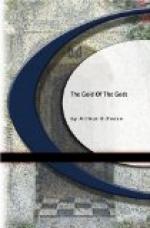“I don’t like her,” returned Inez, with a frown. “My father knew her—too well. She is a schemer, an adventuress. Once she has a hold on a man, one cannot say—” She paused, then went on in a different tone. “But I would rather not talk about the woman. I am afraid of her. Never does she talk to me that she does not get something out of me that I do not wish to tell her. She is uncanny.”
Personally, I could not blame Inez for her opinion. I could understand it. Those often baleful eyes had a penetrating power that one might easily fall a victim to.
“But you can trust Mr. Lockwood,” he returned. “Surely he is proof against her, against any woman.”
Inez flushed. It was evident that of all the men who were interested in the little beauty, Lockwood was first in her mind. Yet when Kennedy put the question thus she hesitated. “Yes,” she replied, “of course, I trust him. It is not that woman whom I fear with him.”
She said it with an air almost of defiance. There was some kind of struggle going on in her mind, and she was too proud to let us into the secret.
Kennedy rose and bowed. For the present he had come to the conclusion that if she would not let us help her openly the only thing to do was to help her blindly.
Half an hour later we were at Norton’s apartment, not far from the University campus. He listened intently as Kennedy told such parts of what we had done as he chose. At the mention of the arrow poison, he seemed startled beyond measure.
“You are sure of it?” he asked anxiously.
“Positive, now,” reiterated Kennedy.
Norton’s face was drawn in deep lines. “If some one has the secret,” he cried hastily, “who knows when and on whom next he may employ it?”
Coming from him so soon after the same idea had been hinted at by the coroner, I could not but be impressed by it.
“The very novelty of the thing is our best protection,” asserted Kennedy confidently. “Once having discovered it, if Walter gives the thing its proper value in the Star, I think the criminal will be unlikely to try it again. If you had had as much experience in crime as I have had, you would see that it is not necessarily the unusual that is baffling. That may be the surest way to trace it. Often it is because a thing is so natural that it may be attributed to any person among several, equally well.”
Norton eyed us keenly, and shook his head. “You may be right,” he said doubtfully. “Only I had rather that this person, whoever he may be, had fewer weapons.”
“Speaking of weapons,” broke in Kennedy, “you have had no further idea of why the dagger might have been taken?”
“There seems to have been so much about it that I did not know,” he returned, “that I am almost afraid to have an opinion. I knew that its three-sided sheath inclosed a sharp blade, yet who would have dreamed that that blade was poisoned?”




